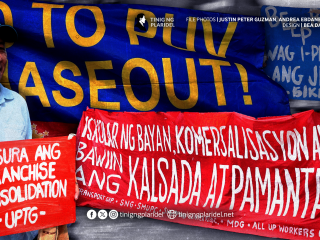Story by E.B. and T.N.
The culture of impunity remains one of the biggest challenges in obtaining justice for the victims of the 2009 Ampatuan massacre, journalists and press freedom advocates said.
In a media forum organized by the UP College of Mass Communication Student Council on Tuesday, Nov. 21, human rights advocate Edith Burgos highlighted that legal reforms should have been institutionalized to address impunity and prevent media killings.
“Even if there were penalties, the impact of the punishment, I think, did not really sink into society now,” Burgos said.
The term “culture of impunity” has been widely used in the Philippine media landscape because criminals responsible for threats and attacks against the press are seldom held accountable.
The Committee to Protect Journalists (CPJ) has touted the Ampatuan massacre as the “single deadliest attack on the press,” which took away the lives of 58 individuals, including 32 media workers.
The journalists were supposed to cover the candidacy of Esmael Mangudadatu as governor of Maguindanao, which will be filed by his wife. The election-related story was considered big as this was the first time the Ampatuan’s political rule would be challenged in the province.
However, the convoy carrying the group of civilians and reporters was ambushed by accomplices of the Ampatuans before they were gunned down and buried in a hillside.
Fourteen years after the massacre, full justice remains elusive as only 44 out of 197 accused were convicted in what was called the “trial of the decade” in 2009.
Read: Principal accused found guilty in Ampatuan massacre case
Meanwhile, more than 80 suspects remain at large, while some are still appealing their cases for possible acquittal.
Further, journalists are also calling the verdict “partial” because photojournalist Reynaldo Momay, whose body was never found at the crime scene, was not recognized as a legitimate victim of the massacre.
Members of the Ampatuan clan, the political dynasty responsible for the massacre, even managed to win government posts in Maguindanao.
“Do journalists feel safer now? Traumatized pa rin tayo. Hanggang ngayon tuloy-tuloy ang impunity,” Burgos added.
Insidious attacks
Apart from violence in the physical space, Vera Files reporter Nica Hanopol said the slow justice system has enabled the culture of impunity to take “insidious forms online.”
“The journalism we are experiencing now is still under immense pressure despite the Marcos administration saying na less harsh sila,” Hanopol said.
Under President Ferdinand Marcos Jr.’s term so far, four journalists have already been killed, according to the National Union of Journalists of the Philippines (NUJP). They are radio broadcasters Rey Blanco, Percy Lapid, Cresenciano Bunduquin and Juan Jumalon.
READ: Ang bawat numero ay may mukha at kuwento
Moreover, the media group has also recorded at least 100 attacks against media workers in the form of surveillance, red-tagging, and libel, among others.
Citing misleading claims about the ABS-CBN shutdown and the Philippine’s ranking in the Global Impunity Index, Hanopol related impunity with disinformation, saying the distortion of the truth about the struggles of the press makes it more difficult to seek proper accountability.
She also said the remote setup of online platforms allows purveyors of threats and false information to escape liability by deleting their accounts in just one click.
Moving forward
UP Journalism Associate Professor Danilo Arao emphasized that there is a need to “popularize” the concept of impunity by simplifying the discourse and integrating with the masses.
“Hindi lamang simpleng pananaliksik sa nangyayari sa lipunan yung mahalaga. Kailangan talaga yung tinatawag natin immersion, ‘yung paglubog sa masa. It is done with humility,” Arao said.
Moving forward, Arao also said owners of social media platforms should be held accountable for allowing viral false information to thrive online for profit.
A 2022 Pulse Asia nationwide survey revealed that about 68% of Filipinos have read or seen false information on the internet or social media.
Arao also cautioned about government legislation that aims to curtail freedom of speech and expression in the guise of controlling disinformation.
“We have to be mindful of the agenda of the government kasi they will always weaponize and they will always find excuses to suppress the press,” he said.
On Nov. 23, press freedom advocates and student journalists gathered in front of the UP College of Mass Communication to amplify their calls to end impunity and institutionalize more support for campus publications.
A candle lighting protest was later held to pay tribute to the victims of the massacre and all journalists killed worldwide.
Editor’s Note: Tinig ng Plaridel is a media partner of Break Free, the annual event spearheaded by UJP-UP to commemorate the Ampatuan Massacre.









